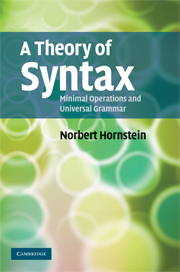Book contents
- Frontmatter
- Contents
- Preface
- 1 Minimalism and Darwin's Problem
- 2 Deriving c-command
- 3 Labels, recursion and movement
- 4 Some thoughts on adjunction
- 5 The emerging picture: Basic operations, FL and the Minimalist Program
- 6 Stop AGREEing! Keep Moving!
- 7 Conclusions, consequences and more questions
- References
- Index
5 - The emerging picture: Basic operations, FL and the Minimalist Program
Published online by Cambridge University Press: 01 July 2009
- Frontmatter
- Contents
- Preface
- 1 Minimalism and Darwin's Problem
- 2 Deriving c-command
- 3 Labels, recursion and movement
- 4 Some thoughts on adjunction
- 5 The emerging picture: Basic operations, FL and the Minimalist Program
- 6 Stop AGREEing! Keep Moving!
- 7 Conclusions, consequences and more questions
- References
- Index
Summary
Introduction
Hauser, Chomsky and Fitch (2002) have put the following question on the research agenda: what features of the faculty of language (FL) are unique and which are common across cognitive domains or reflect general principles of computation? The answer to this question is of interest to linguists for the light that it can shed on Darwin's Problem, i.e. the logical problem of language evolution. As outlined in Chapter 1, there is a tension between the distinctiveness of the basic features of FL and the apparently short time course of its emergence. The rapidity of FL's emergence suggests that it is only modestly different from non-linguistic aspects of cognition. If this is correct, then one aim of theoretical syntax should be to show how the gross features of FL result from the combination of general cognitive operations and principles plus a very small number of innovations (preferably one) specific to FL. This chapter aims to examine the proposals outlined in the preceding three chapters in this light. The chapter is short as it relies on the conclusions of Chapters 2 through 4. However, the point of the exercise is to sufficiently annotate the logical problem of language evolution so that its high level empirical implications gain a modest heft.
The basic operations of FL and the “laws” of UG
The previous three chapters have relied on the following inventory of basic operations: Concatenate, Copy, and Label.
- Type
- Chapter
- Information
- A Theory of SyntaxMinimal Operations and Universal Grammar, pp. 106 - 125Publisher: Cambridge University PressPrint publication year: 2008



